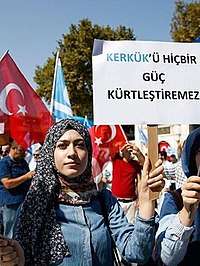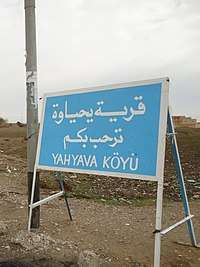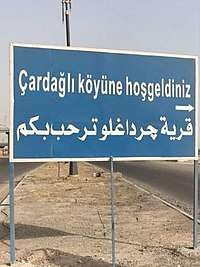Turkmeneli


Turkmeneli, also known as Turkmenland,[1] and historically as Turcomania,[2] (Turkish: Türkmeneli, lit. 'Land of the Turkmens') is a political term used by the Iraqi Turkmen/Turkoman minority in Iraq to define the vast swath of territory in which they have historically had a dominant population.[3] The term incorporates the Iraqi Turkmen/Turkoman homelands running from Iraq's border with Turkey and Syria and diagonally down the country to the border with Iran.[2]
In particular, the Turkmen/Turkoman consider the capital of Turkmeneli to be Kirkuk and its boundaries also include Tel Afar, Mosul, Erbil (a part of Iraqi Kurdistan) , Mandali, and Tuz Khurmato.[4][5] According to Liam Anderson and Gareth Stansfield, the Turkmen/Turkoman note that the term "Turcomania" – an Anglicized version of "Turkmeneli" – appears on a map of the region published by William Guthrie in 1785, however, there is no clear reference to Turkmeneli until the end of the twentieth century.[2]
The Turkmen/Turkoman homeland
The Iraqi Turkmen/Turkomans generally consider several major cities, and small districts associated with these cities, as part of their homeland.[6] The major cities claimed to be a part of Turkmeneli, in a north-to-south order, include: Mosul, Erbil, Kirkuk, Salahaldeen and Diala, Tal Afar, Sancar, Altun Kupri, Kifri, Khanaqin, Kizilribat, Bakuba and Mendeli.[6] Consequently, the Turkmeneli region lies between the Arab areas of settlement to the south and Kurdish areas to the north.[6]
Prospects of an autonomous region


According to Khalil Osman there has been "a raft of federalist schemes" proposed by various Turkmen/Turkoman political parties.[5] For example, one controversial proposal to set up Turkmeneli as a Turkmen/Turkoman automonous region included the areas nortwest of Iraq, from Tel Afar in Ninewah Province, through Kirkuk/Ta'amim Province and Tuz Khurmatu District in Salah al-Din Province in north-Central Iraq, to Mandali in the Diyala Province in the northeast of Baghdad.[5]
Vahram Petrosian suggests that the Iraqi Turkmen Front's (ITF) forwarding of the idea of the recognition of Turkmeneli may pave the way for a future Kurdish-Turkmen conflict.[7]
In 2016 Wassim Bassem reported that the Turkmen/Turkoman have been calling for their own independent province in the Tal Afar district.[8] Their demands had coincided with calls for the establishment of other new provinces for the Christian and the Yazidi minorities.[8]
On 17 July 2017, Turkmens proposed that Tel Afar and Tuz Khurmatu to become an autonomous Turkmen region and asked for a "special status" for Kirkuk in a summit in Baghdad under the name "Future of Turkmens in United Iraq".[9]Also asked to "training and equipping the Turkmen Hashd al-Shaabi forces."[10]
Gallery
 Bilingual sign in Arabic and Turkish
Bilingual sign in Arabic and Turkish Bilingual sign in Arabic and Turkish
Bilingual sign in Arabic and Turkish Bilingual sign in Arabic and Turkish
Bilingual sign in Arabic and Turkish
See also
References
- ↑ Rich, Paul J. (2008), Iraq and Rupert Hay's Two Years in Kurdistan, Lexington Books, p. x, ISBN 1461633672
- 1 2 3 Anderson, Liam; Stansfield, Gareth (2009), Crisis in Kirkuk: The Ethnopolitics of Conflict and Compromise, University of Pennsylvania Press, p. 56, ISBN 0812206045
- ↑ Strakes, Jason E. (2009), "Current Political Complexities of the Iraqi Turkmen", Iran & the Caucasus, Brill Publishers, 13 (2): 369
- ↑ Anderson & Stansfield 2009, 57
- 1 2 3 Osman, Khalil (2015), Sectarianism in Iraq: The Making of State and Nation Since 1920, Routledge, p. 243, ISBN 1317674871
- 1 2 3 Oğuzlu, Tarik H. (2004), "Endangered community:The Turkoman identity in Iraq", Journal of Muslim Minority Affairs, Routledge, 24 (2): 313
- ↑ Petrosian, Vahram (2003), "The Iraqi Turkomans and Turkey", Iran & the Caucasus, Brill Publishers, 7 (1/2): 305
- 1 2 Bassem, Wassim (2016). "Iraq's Turkmens call for independent province". Al-Monitor.
- ↑ Iraqi Turkmen to propose ‘special status’ for Kirkuk
- ↑ Iraq meeting tackles Turkmens' future in post-Daesh era
Bibliography
| Wikimedia Commons has media related to Türkmeneli. |
- Anderson, Liam; Stansfield, Gareth (2009), Crisis in Kirkuk: The Ethnopolitics of Conflict and Compromise, University of Pennsylvania Press, ISBN 0812206045
- Oğuzlu, Tarik H. (2004), "Endangered community: the Turkoman identity in Iraq", Journal of Muslim Minority Affairs, Routledge, 24 (2)
- Osman, Khalil (2015). "Sectarianism in Iraq: The Making of State and Nation Since 1920". Routledge. ISBN 1317674871. Missing or empty
|url=(help) - Petrosian, Vahram (2003), "The Iraqi Turkomans and Turkey", Iran & the Caucasus, Brill Publishers, 7 (1/2)
- Rich, Paul J. (2008), Iraq and Rupert Hay's Two Years in Kurdistan, Lexington Books, ISBN 1461633672
- Strakes, Jason E. (2009), "Current Political Complexities of the Iraqi Turkmen", Iran & the Caucasus, Brill Publishers, 13 (2)
Further reading
- Ketene, Orhan (2007). "Turkmen and Turkmeneli" (PDF). Archived from the original (PDF) on 2014-07-26. Retrieved 2014-08-03.
- Ezzat, Yawooz (2012). The Treatment of Iraqi Turks Since the Aftermath of WWI: A Human Rights. Trafford Publishing (Book on Demand). ISBN 978-1-4669-4605-7.
- Kerkuklu, Mofak Salman (2004). Brief History of Iraqi Turkmen. Istanbul: Yildiz Press. ISBN 9789756855126.
Coordinates: 35°12′04″N 43°57′54″E / 35.201°N 43.965°E